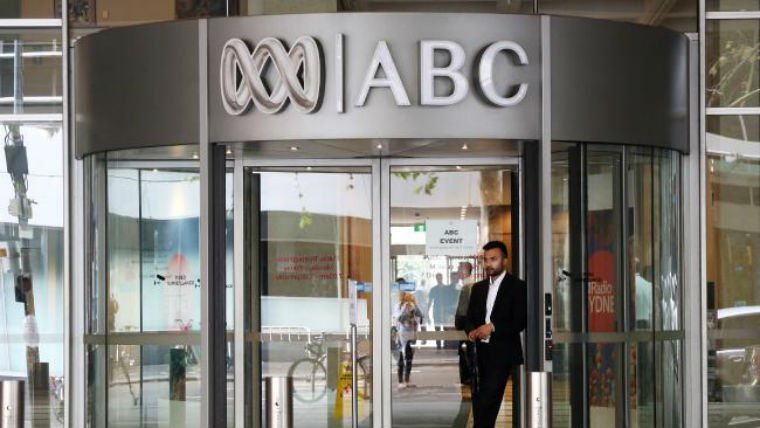It is revealing that in attempting to demonstrate that the ABC is not biased against the views of mainstream Australians, ABC board member Joseph Gersh, writing in The Australian on Tuesday, used as proof the composition of the panel on the ABC's premiere discussion and current affairs program, Q&A.
 He described Paul Kelly and Malcolm Turnbull as conservative, which is false. They would not describe themselves as such. They would be more accurately termed small-l liberal.
He described Paul Kelly and Malcolm Turnbull as conservative, which is false. They would not describe themselves as such. They would be more accurately termed small-l liberal.
What Gersh did not mention was that the other three panel members were former NSW Labor premier Bob Carr, left-wing activist Jan Fran and left-wing academic Jenny Hocking, not to mention left-wing host Hamish Macdonald. Not a single conservative among them. (At most maybe one of those six might be an occasional Coalition voter.) The point of mentioning this is that last week's display is representative of the bias the ABC presents daily.
This, after seven years of Coalition government, reveals the truth of Gersh's comment that many on the right side of politics are realising the ABC cannot be reformed.
Throughout history I have always supported more freedom of speech and more diversity in the media. A media organisation owned and operated by the government that every taxpayer is forced to fund is incompatible with a free society. I support the continued existence of the ABC, but not one that is controlled by government and funded by taxpayers.
If the ABC is as necessary, popular and trusted as Gersh makes it out to be, then ABC staff have nothing to fear in operating a successful media business in the private media market. A subscription service, as is being proposed for the BBC in Britain, is a sensible policy the government should adopt.
His assertion that "calls for the abolition or privatisation of the ABC (essentially the same thing) are a thought bubble for which there is no constituency on either side of politics" ignores the fact ABC privatisation motions have succeeded at many Liberal Party branches, including at federal council as recently as 2018. With Labor appearing as out of touch with mainstream Australia as the ABC, it is an entirely reasonable proposition that the Coalition could achieve a workable Senate after the next federal election. Perhaps this reality is why the ABC has been so quick to describe an entirely achievable mainstream policy of ABC reform as lacking support.
However, Gersh's assertion that "the ABC remains Australia's most trusted source of news and current affairs" is inconsistent with the views of mainstream Australians, with recent polling commissioned finding less than one-third of Australians believe the ABC reflects the views of ordinary Australians.
As commentator Gerard Henderson has noted, the ABC is "a conservative-free zone" without one conservative presenter, producer or editor on any of its prominent television, radio, or online outlets.
There is perhaps no better example of the bias of the ABC than the uncritical platform given to former prime minister Kevin Rudd's revenge petition for a "Murdoch royal commission" to examine Australia's media market.
In just over one month since the petition was launched, the ABC across all of its platforms has mentioned "Murdoch" and the petition 3595 times. That is not the ABC providing news coverage; it is the ABC proving its obsession with its own ideological agenda.
The ABC's preoccupation with its left-wing progressive world view is revealed in its coverage of almost every policy issue. A 2014 analysis by iSentia of the ABC's news coverage found that 52 per cent of coverage of renewable energy was favourable, in comparison to 12.1 per cent for coal-seam gas and 15.9 per cent for coalmining. The systemic nature of bias at the ABC demonstrates that only structural change will resolve the problems.
It is revealing that the most passionate defenders of the ABC are the Greens because it uncritically presents their world view while mainstream Australians pay for it. While Rudd's petition has attracted more than 500,000 signatures, that is still only one-third of the Greens' Senate vote in Australia.
Rudd's petition has achieved some success though. The Greens were successful is launching a Senate inquiry into "the state of media diversity, independence and reliability in Australia and the impact that this has on public interest journalism and democracy".
Calls for a royal commission come from an elitist mindset resident in many of our institutions, universities and among ABC staff, that the left-wing world view is so moral and so perfect that everyone who holds a different opinion must be ill informed. A healthy democracy is one in which the media makes life difficult for the government. A society in which the government makes life difficult for the media is inherently dangerous.
The ABC says it wants diversity, but the most important diversity is diversity of opinion. This is the diversity chairwoman Ita Buttrose refuses to accept. She told the ABC last year, "I certainly hadn't thought that Andrew Bolt would be a great fit for the ABC." That is a strange admission given Bolt is Australia's most read journalist.
The debate on ABC reform and privatisation is one worth having. Except Australia's elite has lost the ability to debate, seeking only to censor and control viewpoints such as those you'll find in this newspaper.
No comments:
Post a Comment